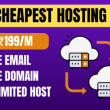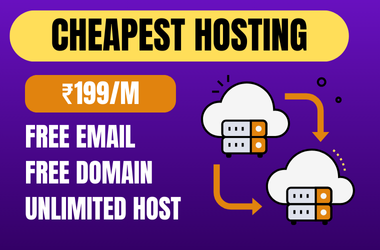Increase your website performance with cheap website hosting buy a budget friendly hosting for your website in 2024 with best service and support.
When you’re diving into the world of cheap website hosting, it can feel like you’re wading through a sea of tech terms. Storage, bandwidth, uptime—what do they all mean, and how much do you actually need? Don’t worry, you’re not alone! Whether you’re launching your first blog, creating an online store, or revamping a personal website, assessing your hosting needs is key to making sure your site runs smoothly. Let’s break down these concepts into bite-sized pieces so that you can make the right decision without getting a headache.

Understanding Storage: How Much Space Do You Really Need?
Think of storage as your website’s digital closet. Every piece of content on your site—whether it’s a blog post, image, or video—takes up space. The more content you have, the bigger the closet you’ll need. If you’re starting small, with just a few pages and some text, you likely won’t need much storage. In fact, most cheap website hosting plans offer more than enough for personal blogs or simple business sites. Cheap website hosting provide you useful space for your website.
However, if you plan to upload tons of high-quality images, host videos, or run a massive online store, you’ll need to consider a plan that gives you more room to grow. Some budget-friendly hosting options offer scalable storage, so you can start small and expand later as your site grows.
The key here is balance. You don’t want to pay for more space than you need, especially when you’re trying to keep things affordable. But you also don’t want to run out of room, which can lead to a sluggish site or extra fees. Make sure to review your content plans before choosing a hosting package to find the sweet spot!
Bandwidth: Keeping Your Visitors Happy
Bandwidth is the amount of data your website can transfer to visitors over a certain period. Think of it as a highway for your site traffic—the wider the highway, the more cars (visitors) can move through without getting stuck in a traffic jam (slow load times). The more people visiting your site, and the more complex your site’s content (images, videos, etc.), the more bandwidth you’ll need.
So, how much bandwidth do you actually need? If you’re running a small blog or a basic business website, the answer is probably: not a lot. Most cheap website hosting plans come with more than enough bandwidth to accommodate small sites with light traffic. However, if you expect a lot of visitors or are offering downloadable content, you may need to upgrade to a higher bandwidth plan.
Cheap website hosting doesn’t always mean limited bandwidth, though. Many affordable hosting providers offer unlimited bandwidth as part of their package, which is great news if you want to avoid surprise charges when your traffic spikes. Just make sure to check the fine print—sometimes “unlimited” comes with some restrictions!
Uptime: Why Downtime is Your Enemy
Uptime refers to the amount of time your website is up and running without any hiccups. Imagine your site as a shop—if the doors are closed, no one can come in. The same goes for your website: if it’s down, your visitors can’t access your content, and you might lose potential customers or readers. This is where uptime guarantees come into play.
Most cheap website hosting providers offer uptime guarantees, with many promising 99.9% uptime. That sounds pretty solid, right? But it’s important to remember that even a fraction of downtime can mean hours of your site being unavailable each month. That might not seem like a big deal, but it could hurt your business if it happens during peak times or a product launch.
When evaluating hosting options, make sure you’re getting a provider with a strong uptime track record. Read reviews, check out their guarantees, and look for any history of outages. A small investment in a more reliable host can save you headaches—and lost visitors—down the line.
Finding the Right Balance
In the end, choosing cheap website hosting doesn’t mean you have to sacrifice performance or reliability. It’s all about finding the right balance of storage, bandwidth, and uptime based on your specific needs. Whether you’re starting with a simple blog or planning to grow into an eCommerce powerhouse, understanding these three factors will help you pick a hosting plan that fits both your goals and your budget.
The great thing about many cheap hosting providers is that they offer flexible plans that let you upgrade as your website grows. Start small, assess your needs as they change, and you’ll always have a hosting solution that works for you. Keep in mind that while cheap hosting can be great for starting out, it’s worth reassessing your needs regularly to make sure your website continues to run smoothly as you grow.
With the right plan, you’ll keep your website running without breaking the bank—and that’s a win-win!
Comparing Different Hosting Plans: Shared vs. VPS vs. Cloud Hosting
When you’re on a budget and looking for cheap website hosting, it’s easy to get overwhelmed by the different types of hosting plans. What’s the difference between shared, VPS, and cloud hosting? Which one is the best value for your money? Don’t worry, we’ve all been there. Whether you’re starting a small blog or planning to scale up, understanding how these hosting options work will help you find the perfect fit without breaking the bank.
Let’s take a closer look at shared hosting, VPS hosting, and cloud hosting, breaking them down in simple terms so you can make a decision with confidence.
Shared Hosting: The Budget-Friendly Choice
Shared hosting is like renting a room in a large house with a bunch of other people. You all share the same resources, such as the kitchen (storage), living room (bandwidth), and bathroom (server performance). This is typically the most affordable hosting option, making it ideal for beginners, bloggers, or small businesses that don’t expect a ton of traffic.
With shared hosting, you’re splitting the server’s resources with other websites, which is why it’s so cheap. The downside is that if one of your “neighbors” starts hogging resources (imagine someone leaving the water running all day), it can affect your website’s performance. Pages may load slower, and if the server gets too crowded, you might even experience some downtime.
But for most small websites, shared hosting provides more than enough power. If you’re just starting and don’t expect a huge influx of visitors, shared hosting can give you everything you need without costing much.
VPS Hosting: The Next Step Up
VPS (Virtual Private Server) hosting is like upgrading from a shared house to your own apartment. You still share the same building with other tenants, but you have your own dedicated space and utilities. In the hosting world, this means you get a portion of the server’s resources that’s reserved just for you, even though you’re still on a shared server.
VPS hosting is a great middle-ground option for those who need more control and better performance but aren’t quite ready to pay for a full dedicated server. It’s perfect if you have a growing website that’s starting to see more traffic or if you need more security for sensitive data. Plus, with VPS hosting, you get more flexibility to configure your server settings and install custom software.
That said, VPS hosting can be pricier than shared hosting, but it’s still affordable for many small businesses and tech-savvy bloggers. And the peace of mind that comes with more reliable performance? Totally worth it.
Cloud Hosting: The Flexible Contender
Cloud hosting is like having access to a network of apartments, and you can move from one to another based on your needs. Instead of being limited to one physical server, your website uses resources from multiple servers in a cloud network, giving you flexibility and scalability.
The big advantage of cloud hosting is that it’s super adaptable. If your website suddenly goes viral (fingers crossed!), cloud hosting can handle the extra traffic without slowing down. You only pay for the resources you use, so if your traffic dips back down, your costs stay low. It’s like having a pay-as-you-go phone plan for your hosting needs.
Cloud hosting is also known for its high uptime since it’s not dependent on a single server. If one server in the network goes down, another picks up the slack, ensuring your website stays up and running. However, cloud hosting can sometimes be more expensive than shared or VPS hosting, so it may not be the best choice if you’re on a tight budget.
But if you need flexibility and the ability to scale quickly, cloud hosting can be an excellent investment. It’s particularly useful for eCommerce sites or websites that experience large traffic fluctuations throughout the year. Cheap web hosting is not only the cloud hosting alternative its budget friendly hosting option.
Which Hosting Plan Should You Choose?
The hosting plan you choose depends on your budget, website needs, and future goals. If you’re launching a small website and keeping things simple, shared hosting is your best bet. It’s affordable, easy to use, and more than enough for most beginners.
However, if your site is growing or you want more control over server settings, VPS hosting offers better performance without breaking the bank. It’s a great choice if you’re managing a business site or expect consistent growth.
Finally, if you need scalability and top-tier performance, cloud hosting provides flexibility, making it ideal for high-traffic or resource-heavy sites. The ability to expand your resources as needed is a major perk for those looking to grow.
No matter which option you choose, the great thing about cheap website hosting is that you don’t have to compromise on performance. You can start small, compare your options, and upgrade as your site grows. Just make sure to carefully consider the pros and cons of each type of hosting before diving in, and you’ll be on your way to a smooth, successful website experience.



